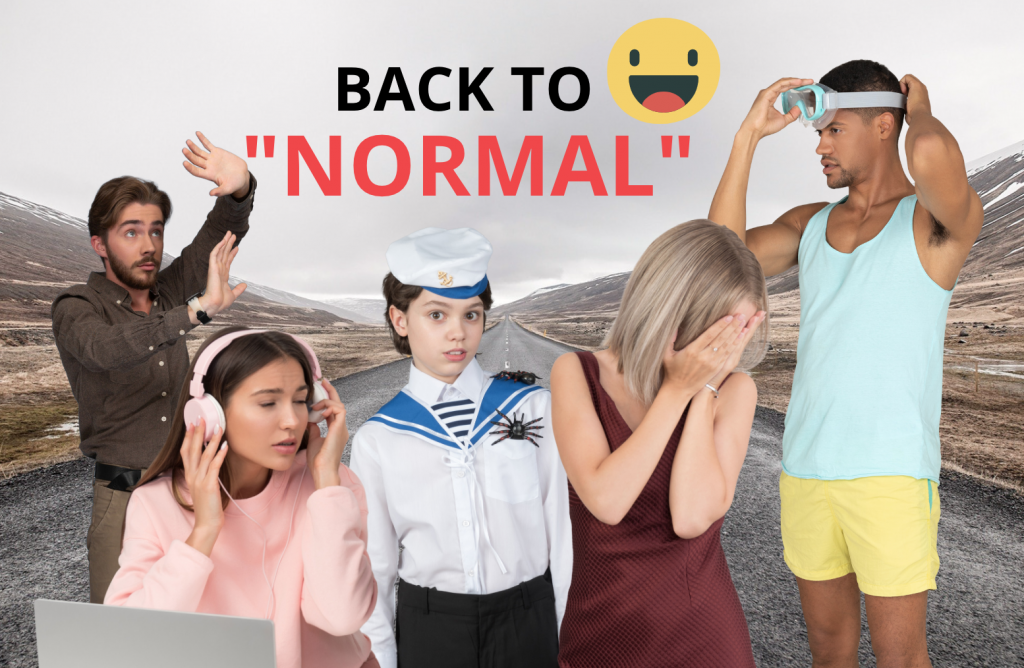I’ve been thinking a lot about going back to life like it was before the pandemic. What people sometimes call “normal” life. Unfortunately, “normal” isn’t something I’m eager to return to. In fact, much of the lockdown really worked for me.
Before the pandemic, it was mostly considered strange when I felt uneasy outside my house. Stress crept into everyday situations, caused anxiety, and often led to panic. Generalized social anxiety and agoraphobia are problems when they cause us to avoid situations, but they are uncomfortable regardless. Those feelings were temporarily easier to manage during the pandemic because we all had a ready excuse for avoiding any and all potentially stressful situations.
From this perspective, the pandemic was a blessing. No pressure to leave the house, quite the contrary. Staying at home was actively encouraged.
The mask gave me permission not to smile, or make awkward attempts to understand the facial expressions of others. Face blindness and fumbled words or mumbling were completely excusable.
The best part was simply being able to tell people you were breaking down without needing to explain why. For a moment, society was uncharacteristically caring and supportive. The hourly struggle of “normal life” was always overwhelming, and we were finally allowed to acknowledge it.
Now that the comfort blanket is being tugged away, I can’t help but be a little recalcitrant. Has the year-long respite from awkward social encounters made me weaker in some way? Questions like this inflate my fear of the inevitable return to “normal.”
Suddenly, I am acutely aware of these longstanding anxieties. Heaps of thinkpieces speculate that this experience is fundamentally transforming our social order; the very nature of our relationships is changing.
In reality, little has changed. There has never been a normal to return to. We’re still human and we will experience this transition through the lens that we choose. Take it as an opportunity. In that way, the days ahead are like every day.
But this moment is different in one important way. This new beginning has some historic gravitas. You’ll be able to remember the things that change as a result of this event. You’ll be able to say, “Ever since the pandemic, it was easier to make friends. Ever since the pandemic I take time for my mental health to be alone and meditate. It’s not difficult to be alone, but I’m more excited than ever to meet new people. I exercise regularly. I cook more and eat healthier.
The choice is yours. You can make a change that brings you closer to your ideal future. Just finish the statement. “Ever since the pandemic,” ended with a behavior or attitude you are excited about.
I’ll admit, I’m a fan of new year’s resolutions, even if they don’t always work out. When it comes to contentment, attitude is everything, and that’s something you can control.
So how can we make this a positive re-entry? There is some mental preparation we can do:
1. Challenge negative feelings
This article on Healthline quotes doctor Keith Morgen who recommends a cognitive treatment for managing anxiety. Ask yourself, “Does the emotion fit the context?”
Chances are, that will loosen up your clenched insides just slightly. A little more room to breathe.
A good follow up challenge is, “How do I want to be perceived in this situation?”
Words like confident, positive, intelligent start coming to mind. Sitting with those positive feelings and mentally applying them to your present moment should start to loosen you up even more.
2. Restore internal balance
Anxiety causes our thoughts and emotions to race, which throws our internal balance. There are three ways I restore balance:
- Increase the speed of my outside to match my inside.
- I do this by exercising before entering a stressful situation.
- I also use big gestures when communicating with people. This makes me more engaging, which makes me feel more confident because people are more likely to listen with interest.
- Slow my internal thoughts with breathing exercises. Ujjayi Breath relaxes our nervous system to reduce inner tension.
- Focus on just one thought. Just breathe and focus only on what you want to say at this moment. Getting ahead of ourselves is when we get nervous.
3. Know thyself
Know who you are and how you want to be perceived. Remind yourself that you’re not afraid of others knowing who you are. There’s nothing to be afraid of. We are all struggling to engage with others. We are all afraid of being sincere and vulnerable enough to create a truly rewarding connection. Come back from the pandemic as the person who is excited about relationships with others.
Remind yourself of the things that make you different. Brag about those things. Yes, brag. At least when you construct your internal narrative. Knowing who you are enables you to engage in social situations with bold positivity and sincere self-assuredness.


